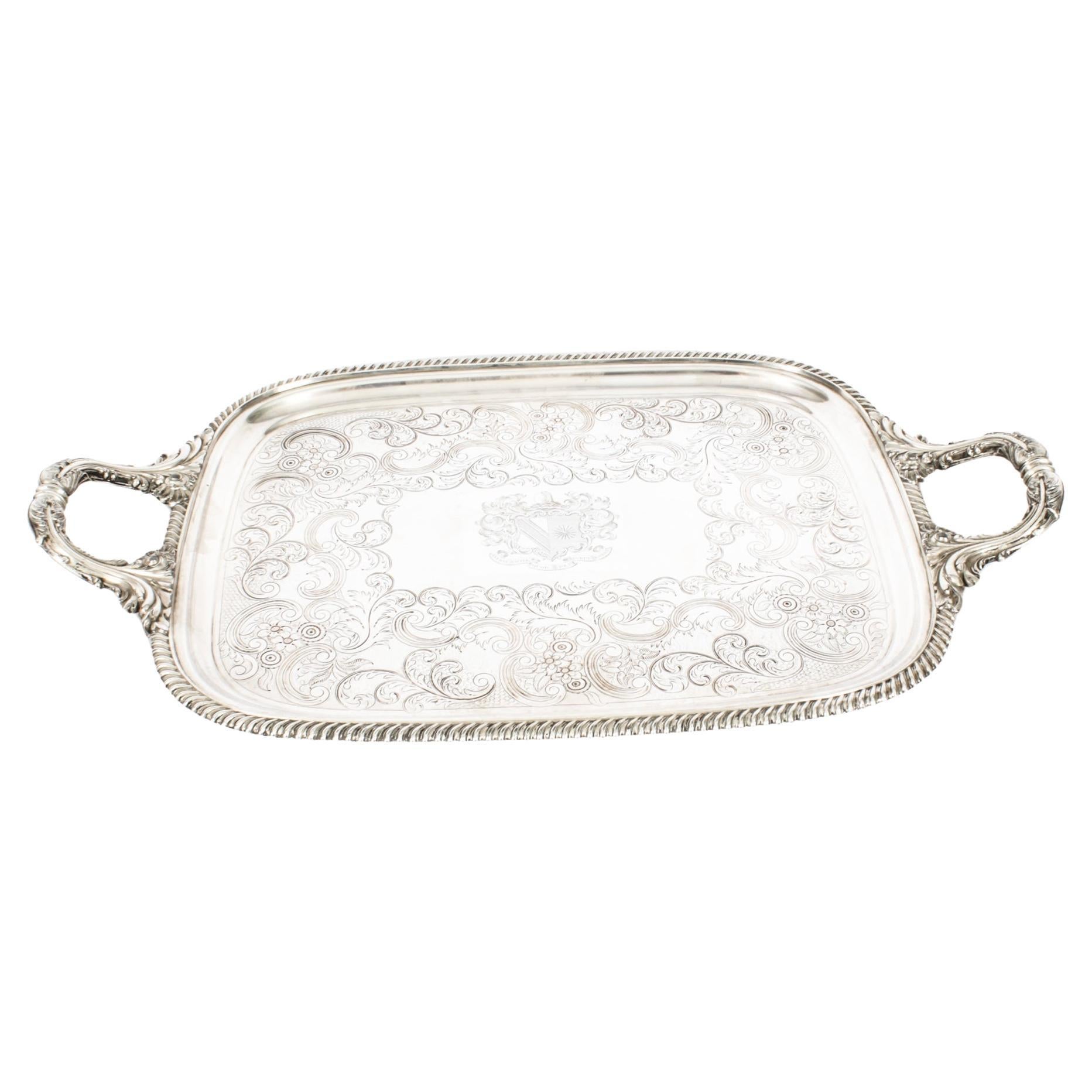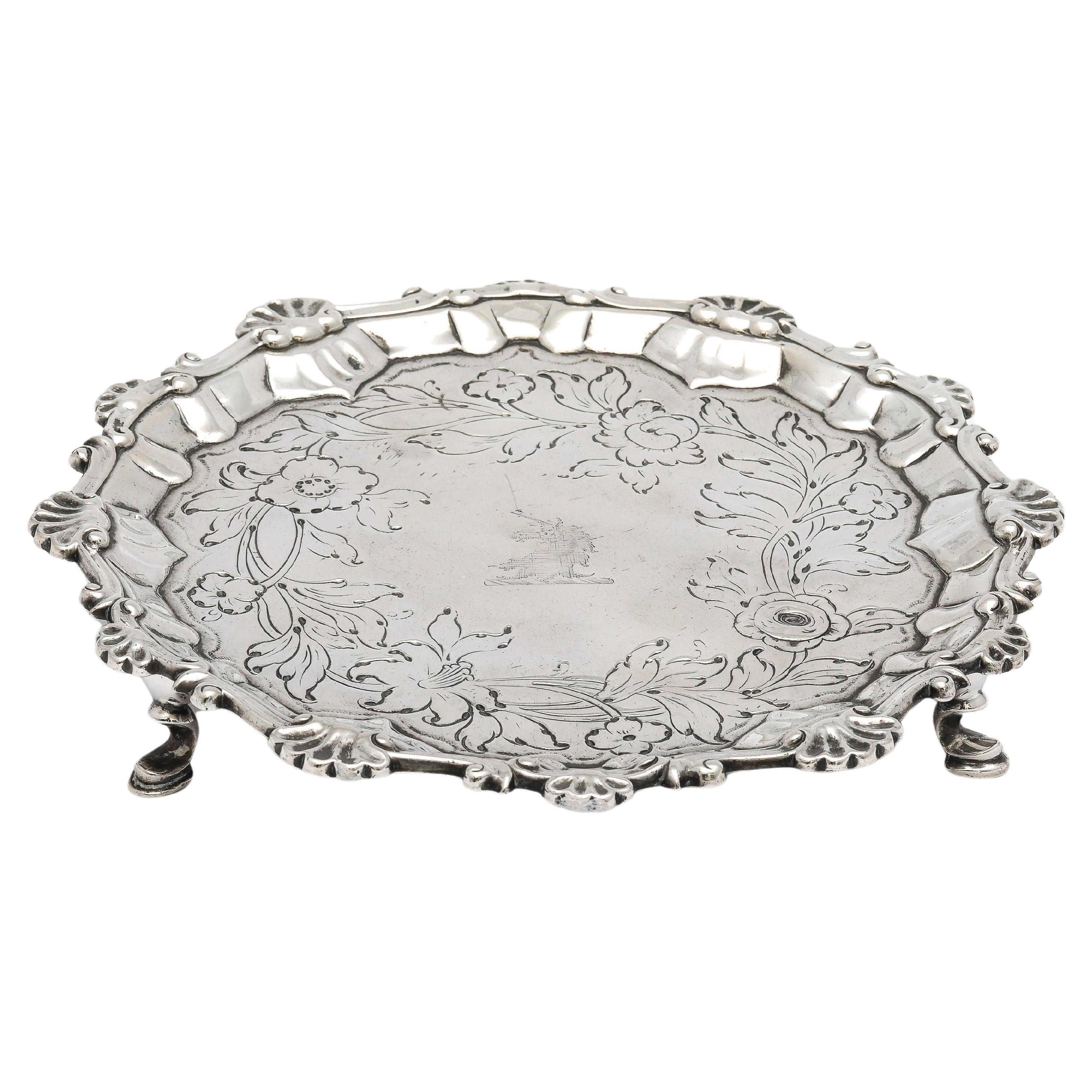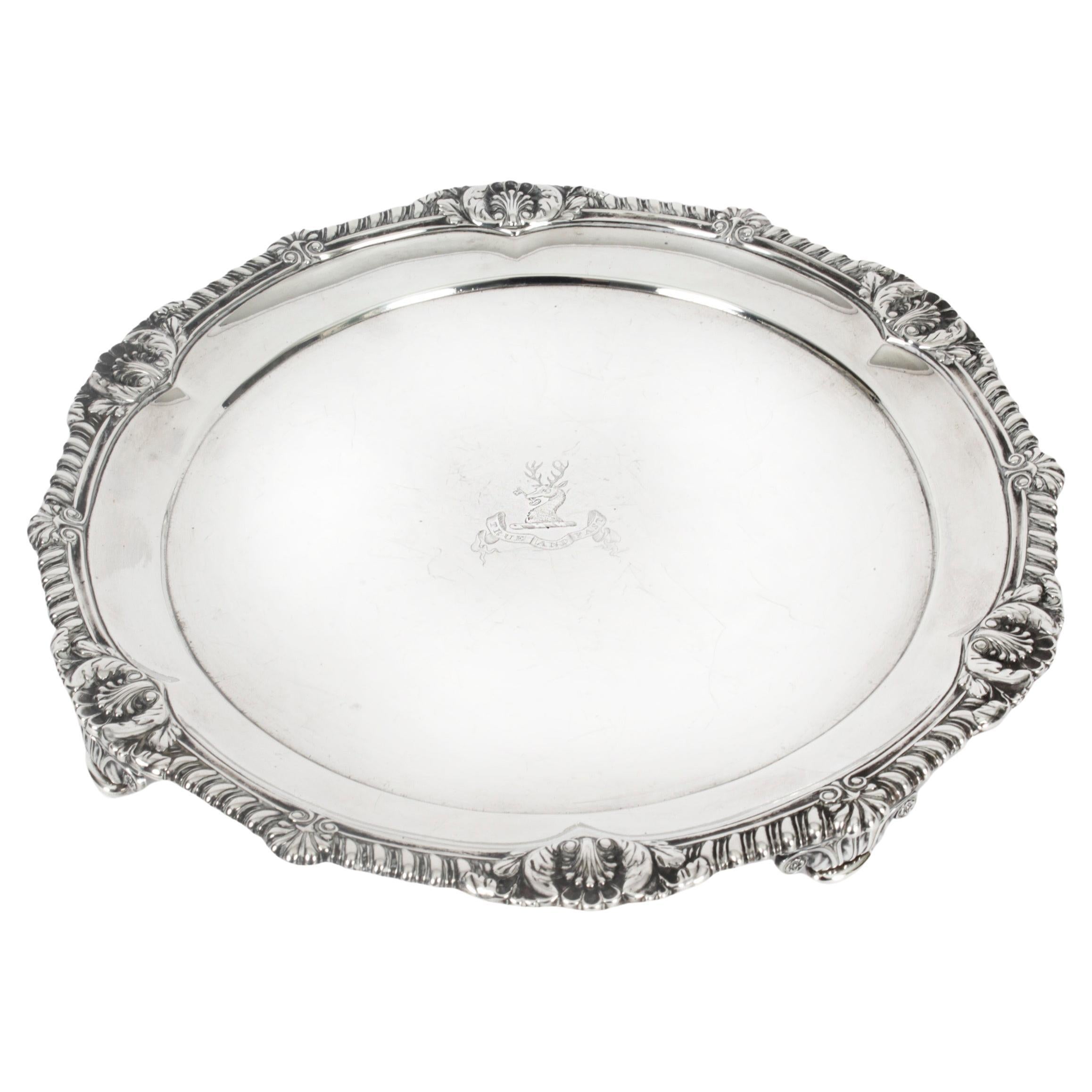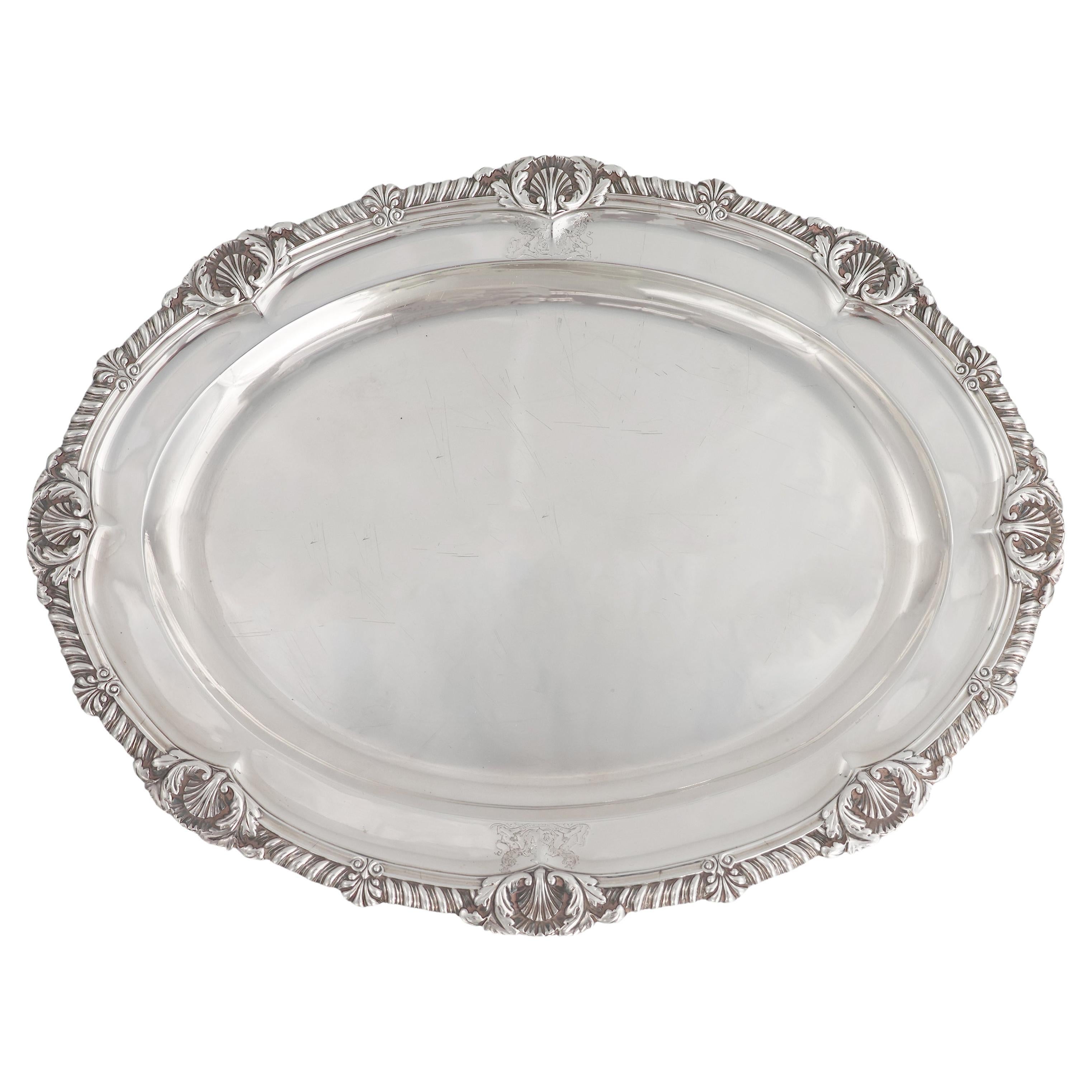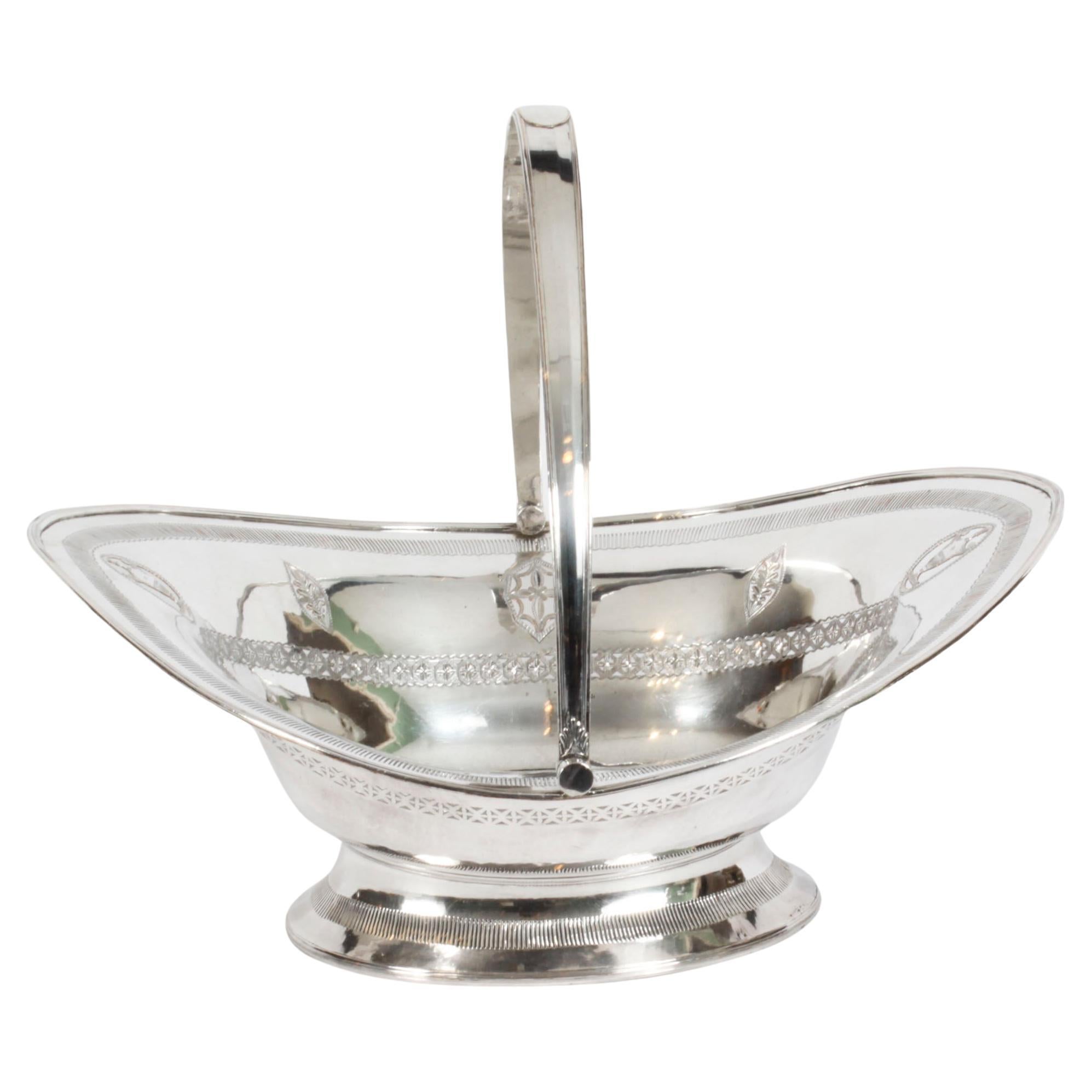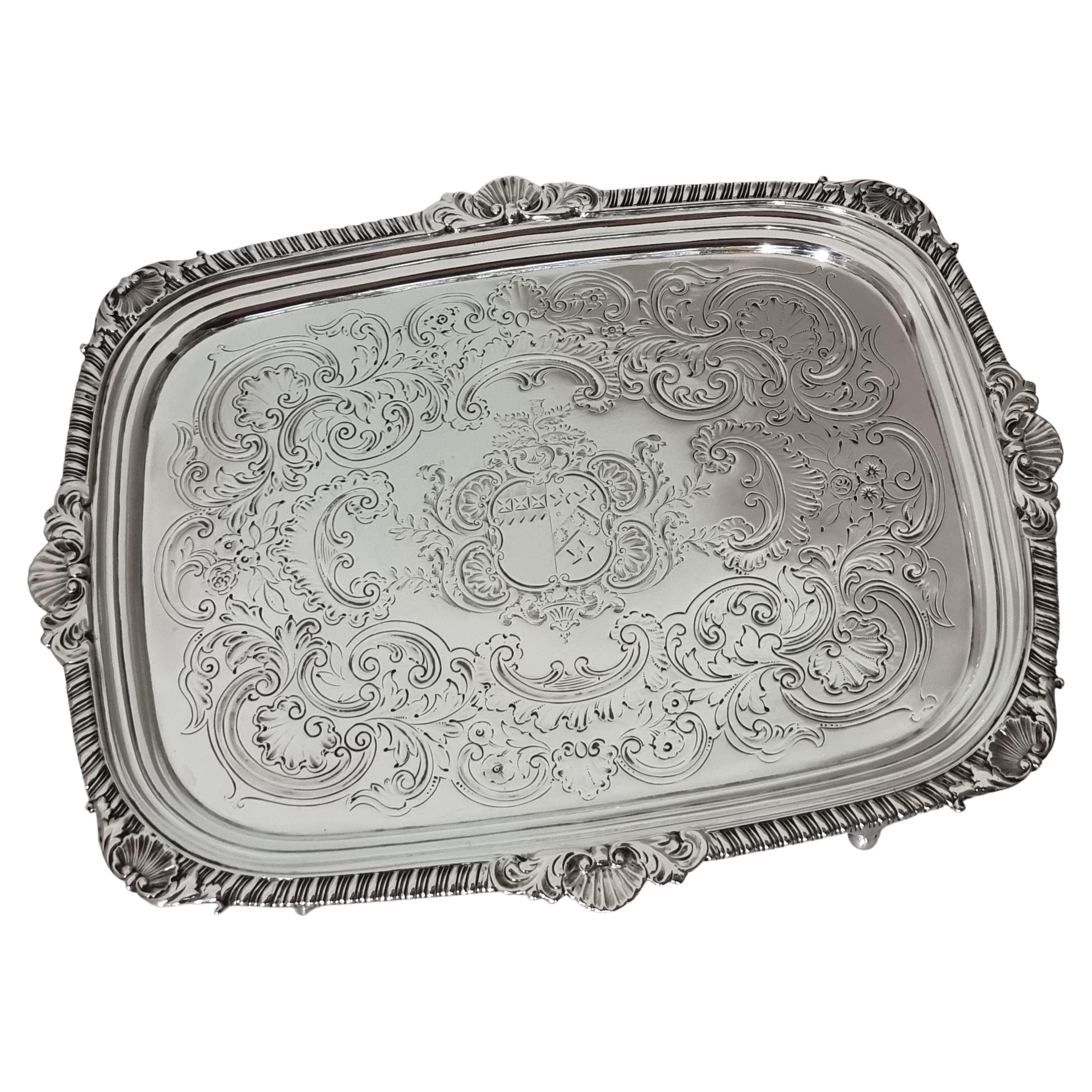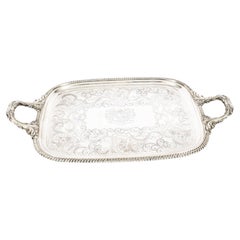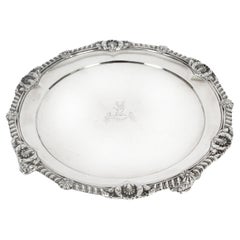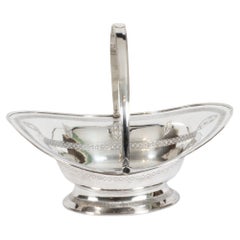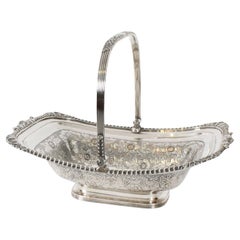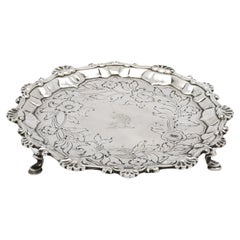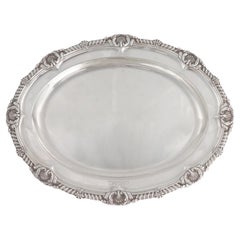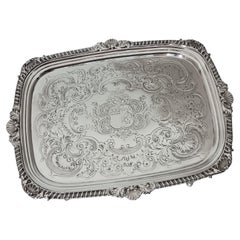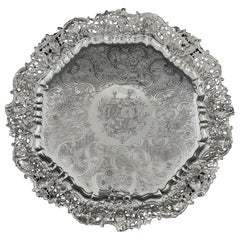Items Similar to Antique George III Old Sheffield Silver Plated 18th Century
Want more images or videos?
Request additional images or videos from the seller
1 of 13
Antique George III Old Sheffield Silver Plated 18th Century
$339.31
£245
€288.18
CA$461.60
A$512.94
CHF 268.79
MX$6,290.32
NOK 3,428.23
SEK 3,225.15
DKK 2,150.82
Shipping
Retrieving quote...The 1stDibs Promise:
Authenticity Guarantee,
Money-Back Guarantee,
24-Hour Cancellation
About the Item
This is an exquisite English antique old Sheffield plate salver, circa 1780 in date.
The elegant raised pie crust border shaped salver features hand chased foliate engraving and sits on three cast reticulated feet.
Add an elegant touch to your next dining experience with this lovely salver.
Condition:
In excellent original condition with no dings, dents or signs of repair, and the copper showing through nicely. Please see photos for confirmation.
Dimensions in cm:
Height 4 x Width 24 x Depth 24
Dimensions in inches:
Height 2 inches x Width 9 inches x Depth 9 inches
Old Sheffield Plate - or ‘fused plate’ as it is sometimes known, was the first commercially viable method of plating metal.
The material was accidentally invented by Thomas Boulsover, of Sheffield's Cutlers Company, in 1743. While trying to repair the handle of a customer's decorative knife, he heated it too much and the silver started to melt. When he examined the damaged handle, he noticed that the silver and copper had fused together very strongly. Experiments showed that the two metals behaved as one when he tried to reshape them, even though he could clearly see two different layers.
Boulsover set up in business, funded by Strelley Pegge of Beauchief, and carried out further experiments in which he put a thin sheet of silver on a thick ingot of copper and heated the two together to fuse them. When the composite block was hammered or rolled to make it thinner, the two metals were reduced in thickness at similar rates. Using this method, Boulsover was able to make sheets of metal which had a thin layer of silver on the top surface and a thick layer of copper underneath. When this new material was used to make buttons, they looked and behaved like silver buttons but were a fraction of the cost.
The technique Boulsover developed was to sandwich an ingot of copper between two plates of silver, tightly bind it with wire, heat it in a furnace and then mill it out in to sheet, from which objects could be made.
- Dimensions:Height: 1.58 in (4 cm)Width: 9.45 in (24 cm)Depth: 9.45 in (24 cm)
- Style:George III (Of the Period)
- Materials and Techniques:
- Place of Origin:
- Period:1780-1789
- Date of Manufacture:circa 1780
- Condition:
- Seller Location:London, GB
- Reference Number:Seller: A2894c1stDibs: LU950631456972
About the Seller
5.0
Platinum Seller
Premium sellers with a 4.7+ rating and 24-hour response times
Established in 1983
1stDibs seller since 2012
1,374 sales on 1stDibs
Typical response time: <1 hour
Associations
LAPADA - The Association of Arts & Antiques Dealers
- ShippingRetrieving quote...Shipping from: London, United Kingdom
- Return Policy
Authenticity Guarantee
In the unlikely event there’s an issue with an item’s authenticity, contact us within 1 year for a full refund. DetailsMoney-Back Guarantee
If your item is not as described, is damaged in transit, or does not arrive, contact us within 7 days for a full refund. Details24-Hour Cancellation
You have a 24-hour grace period in which to reconsider your purchase, with no questions asked.Vetted Professional Sellers
Our world-class sellers must adhere to strict standards for service and quality, maintaining the integrity of our listings.Price-Match Guarantee
If you find that a seller listed the same item for a lower price elsewhere, we’ll match it.Trusted Global Delivery
Our best-in-class carrier network provides specialized shipping options worldwide, including custom delivery.More From This Seller
View AllAntique Old Sheffield Silver Plated Tray George III 1780s
Located in London, GB
This is a superb antique English Old Sheffield Silver Plate tray Circa 1780 in date.
This rectangular Old Shefield tray features a deep set, decorative gadrooned border with elegant...
Category
Antique 1780s George III Serving Pieces
Materials
Silver Plate
Antique George III Sterling Silver Salver by Paul Storr 1811 19th Century
By Paul Storr
Located in London, GB
This is a wonderful English antique George III sterling silver 10 inch salver, by the world famous silversmith Paul Storr.
It has clear hallmarks for London 1811 and the makers mark of Paul Storr.
It is typical of his work with the raised gadrooned rim with anthemion at intervals, on four fabulous foliate bracket feet. The salver is engraved with a crest and motto and the underside is later engraved
Charlotte J. Parke from C. J. Parke, March 1893'
The centre is engraved with a crest above a motto 'True and Fast' and I have researched this crest:
The Crest of Parke
The crest as engraved upon this George III English Sterling Silver Footed Salver by Paul Storr hallmarked London 1811 is that of the family of Parke. It may be blazoned as follows:
Crest: A stag’s head couped sable holding in the mouth a key or
Motto: True and fast
The family of Parke originally hailed from the County of Cumberland in the northeast of England1 later settling in the County of Dorset at Henbury House, Sturminster Marshal, near Wimborne. Given the evidence of the inscription found on the underside of the salver ‘Charlotte J. Parke from C. J. Parke, March 1893’ it was undoubtedly at one time in the possession of Charles Joseph Parke (died 9th March 1893) of Henbury House aforesaid and gifted to Charlotte Josephine Parke (baptised 4th January 1857 died 2nd January 1941) his third daughter by his wife, Ellen Mary Ethelston. I would venture the following hypothesis that the salver was bequeathed to Charlotte in her father’s will that was granted probate at London on the 20th May 1893. The ‘March 1893’ of the inscription acts as a remembrance of the month of the death of her father. It was noted that Charlotte’s father left an estate worth some £66,892, 19 shillings and one pence, a very considerable sum in the last decade of the 19th Century and even thereafter. Charlotte never married and was living at the time of her death at The Coppice, Sixpenny Handley in the County of Dorset. Her will was proved for probate at Llandudno on the 25th March 1941. She left an estate worth £18,866, 10 shillings and 4 pence. Again, a comfortable sum in 1941.
See the photo of Henbury House, Sturminster Marshal, near Wimborne, Co. Dorset. The former seat of the Parke family. The house was destroyed by fire, the remains of which were demolished in the 1990's.
There is no mistaking its unique quality and design, which is sure to make it a treasured piece by any discerning collector.
Condition:
In excellent condition with clear hallmarks and no dings, dents or signs of repair. Please see photos for confirmation.
Dimensions in cm:
Height 2 x Width 26.5 x Depth 26.5
Weight 0.69 kg
Dimensions in inches:
Height 1 inch x Width 10 inches x Depth 10 inches
Weight 1.5 lbs
Paul Storr
born in London England in 1771, was to become one of the most talented silversmiths of the nineteenth century. Today his legacy of exceptionally well crafted silver, found worldwide in museums and private collections, leaves one in awe when compared to that of his contemporaries.After having served a seven year apprenticeship from the age of 14, he began his career in 1792 when he went into a brief partnership with William Frisbee. This did not last and in 1793 a new mark, (his initials ‘P S’) was entered. By the beginning of the nineteenth century he had established himself as one of London’s top silversmiths producing, amongst others, commissions for Royalty.
In 1801 he married Elizabeth Susanna Beyer with whom he was to have ten children. In 1807 Paul Storr entered into a working relationship with Philip Rundell and by 1811 was a partner, and managing the workshops for Rundell, Bridge & Rundell.
During this period he kept his own marks and separate workshop. However it was through Rundell, Bridge & Rundell who were appointed Goldsmith in Ordinary to George III in 1804 that his reputation as a master silversmith grew. His talents lay in being able to transform ideas and designs from Rundell, Bridge & Rundell’s designers, William Theed...
Category
Antique 1810s English George III Sterling Silver
Materials
Sterling Silver
Antique George III Old Sheffield Silver on Copper Basket, 18th Century
Located in London, GB
This is a fabulous antique Neo-classical George III Old Sheffield plate silver on copper bread basket / fruit dish, circa 1780 in date.
...
Category
Antique 1780s English George III Sheffield and Silverplate
Materials
Sheffield Plate
Antique George III Old Sheffield Silver on Copper Basket 19th Century
Located in London, GB
This is a fabulous antique Neo-classical George III Old Sheffield plate silver on copper bread basket / fruit dish, circa 1810 in date.
The rectagular swing handled basket features ...
Category
Antique 19th Century English Neoclassical Tableware
Materials
Silver Plate, Copper
Antique Large English Victorian Silver Plated Salver 19th Century
By Elkington & Co.
Located in London, GB
This is a large wonderful antique silver plated Victorian salver bearing the makers marks for the renowned silversmith Elkingon and the date mark for 1888.
It has beautiful embos...
Category
Antique 1880s English Victorian Sheffield and Silverplate
Materials
Silver Plate
Antique Large Victorian Neo Classical Silver Plated Butlers Tray Circa 1870
Located in London, GB
This is a superb antique English Victorian Neo-Classical silver-plated tray, circa 1870 in date.
This shaped rectangular tray features a deep set, decorative acanthus gadrooned bor...
Category
Antique 1870s English Victorian Sheffield and Silverplate
Materials
Silver Plate
You May Also Like
George III Period (1764) Footed Sterling Silver Salver/Tray
By Richard Rugg
Located in New York, NY
George III Period, hoof-footed sterling silver salver/tray, London, year-hallmarked for 1764, Richard Rugg - maker. The salver is designed with a scroll and shell border, and has a l...
Category
Antique 1760s English George III Platters and Serveware
Materials
Sterling Silver
George IV sterling silver presentoire, John Bridge, London 1826
By John Bridge
Located in Brescia, IT
Description
George IV sterling silver presentoire, John Bridge, London 1826.
Oval shape, gadroon edges and stylized shells. Heraldic coat of arms on both sides. Motto: Deo est Patrie...
Category
Antique 1820s British George IV Sterling Silver
Materials
Sterling Silver
George III Sterling Silver Salver, William Bennett, 1809
By William Bennett
Located in Glasgow, GB
A 1809 George III sterling silver salver by William Bennett, showcasing an oblong form with a gadrooned and shell border, adorned with C-scrolls, foliate swags, and an engraved armor...
Category
Antique Early 1800s British George III Sterling Silver
Materials
Silver
Large George IV silver salver
By Joseph Craddock 1
Located in London, GB
A superb quality antique silver salver or charger in the highly decorative rococo style. Made during the reign of George IV, this large silver salver has a cast openwork border fine...
Category
Antique 19th Century British George IV Platters and Serveware
Materials
Sterling Silver
George II Sterling Silver Salver London 1742
By Philip Garden
Located in Tunbridge Wells, GB
Heading : Geogian sterling silver salver with engraving
Date : Hallmarked in London in 1742 for Philip Garden
Period : George II
Origin : London, England
Decoration : Chippendale sty...
Category
Antique 1740s British George II Sterling Silver
Materials
Silver
Sterling Silver George III Period (1765) Hoof-Footed Salver/Tray
By Ebenezer Coker
Located in New York, NY
Sterling silver, George III Period, hoof-footed salver, London, England, year-hallmarked for 1765, Ebenezer Coker - maker. Scroll and shell designed border. Measures almost 6 3/4 inches in diameter x 1 inch high. Weighs 6.280 troy ounces. There is a small, capital letter P monogram...
Category
Antique 1760s English George III Platters and Serveware
Materials
Sterling Silver
More Ways To Browse
Chase Plates
Pie Plate
George Silver Salver
Reticulated Silver Plate
Silver Salver George Iii
Silver Ingots
Antique Pie Plate
Antique Silver Ingot
Silver Plate Salver
Antique Glass Pie Plates
Cutler Roll Top
Sheffield Silver Plate Salver
Antique Sheffield Cutlery
Sheffield Plate Coaster
Silverplate Bird
Caviar Plates
Footed Tray Silver Large
Sheffield Silver Plated Cutlery
